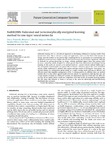Mostrar o rexistro simple do ítem
FedHEONN: Federated and homomorphically encrypted learning method for one-layer neural networks
| dc.contributor.author | Fontenla-Romero, Óscar | |
| dc.contributor.author | Guijarro-Berdiñas, Bertha | |
| dc.contributor.author | Hernández-Pereira, Elena | |
| dc.contributor.author | Pérez-Sánchez, Beatriz | |
| dc.date.accessioned | 2023-11-20T13:38:58Z | |
| dc.date.available | 2023-11-20T13:38:58Z | |
| dc.date.issued | 2023 | |
| dc.identifier.citation | Ó. Fontenla-Romero, B. Guijarro-Berdiñas, E. Hernández-Pereira, and B. Pérez-Sánchez, "FedHEONN: Federated and homomorphically encrypted learning method for one-layer neural networks", Future Generation Computer Systems, vol. 149, 2023, P. 200-211, doi: 10.1016/j.future.2023.07.018 | es_ES |
| dc.identifier.uri | http://hdl.handle.net/2183/34296 | |
| dc.description | Financiado para publicación en acceso aberto: Universidade da Coruña/CISUG | es_ES |
| dc.description.abstract | [Abstract]: Federated learning (FL) is a distributed approach to developing collaborative learning models from decentralized data. This is relevant to many real applications, such as in the field of the Internet of Things, since the models can be used in edge computing devices. FL approaches are motivated by and designed to protect privacy, a highly relevant issue given current data protection regulations. Although FL methods are privacy-preserving by design, recently published papers show that privacy leaks do occur, caused by attacks designed to extract private data from information interchanged during learning. In this work, we present an FL method based on a neural network without hidden layers that incorporates homomorphic encryption (HE) to enhance robustness against the above-mentioned attacks. Unlike traditional FL methods that require multiple rounds of training for convergence, our method obtains the collaborative global model in a single training round, yielding an effective and efficient model that simplifies management of the FL training process. In addition, since our method includes HE, it is also robust against model inversion attacks. In experiments with big data sets and a large number of clients in a federated scenario, we demonstrate that use of HE does not affect the accuracy of the model, whose results are competitive with state-of-the-art machine learning models. We also show that behavior in terms of accuracy is the same for identically and non-identically distributed data scenarios. | es_ES |
| dc.description.sponsorship | This work has been supported by the grant Machine Learning on the Edge - Ayudas Fundación BBVA a Equipos de Investigación Científica 2019; the National Plan for Scientific and Technical Research and Innovation of the Spanish Government (Grants PID2019-109238GB-C2 and PID2021-128045OA-I00); and by the Xunta de Galicia (ED431C 2022/44) with the European Union ERDF funds. CITIC, as a Research Center of the University System of Galicia, is funded by Consellería de Educación, Universidade e Formación Profesional of the Xunta de Galicia through the European Regional Development Fund (ERDF) and the Secretaría Xeral de Universidades (Ref. ED431G 2019/01). Funding for open access charge: Universidade da Coruña/CISUG. | es_ES |
| dc.description.sponsorship | Xunta de Galicia; ED431C 2022/44 | es_ES |
| dc.description.sponsorship | Xunta de Galicia; ED431G 2019/01 | es_ES |
| dc.language.iso | eng | es_ES |
| dc.publisher | Elsevier B.V. | es_ES |
| dc.relation | info:eu-repo/grantAgreement/AEI/Plan Estatal de Investigación Científica y Técnica y de Innovación 2017-2020/PID2019-109238GB-C21/ES/SISTEMAS DE RECOMENDACION EXPLICABLES | es_ES |
| dc.relation | info:eu-repo/grantAgreement/AEI/Plan Estatal de Investigación Científica y Técnica y de Innovación 2017-2020/PID2019-109238GB-C22/ES/APRENDIZAJE AUTOMATICO ESCALABLE Y EXPLICABLE | es_ES |
| dc.relation | info:eu-repo/grantAgreement/AEI/Plan Estatal de Investigación Científica y Técnica y de Innovación 2021-2023/PID2021-128045OA-I00/ES/APRENDIZAJE PROFUNDO ÉTICO | es_ES |
| dc.relation.uri | https://doi.org/10.1016/j.future.2023.07.018 | es_ES |
| dc.rights | Atribución-NoComercial-SinDerivadas 4.0 International (CC BY-NC-ND) | es_ES |
| dc.rights.uri | http://creativecommons.org/licenses/by-nc-nd/3.0/es/ | * |
| dc.subject | Edge computing | es_ES |
| dc.subject | Federated learning | es_ES |
| dc.subject | Homomorphic encryption | es_ES |
| dc.subject | Neural networks | es_ES |
| dc.subject | Privacy-preserving | es_ES |
| dc.title | FedHEONN: Federated and homomorphically encrypted learning method for one-layer neural networks | es_ES |
| dc.type | info:eu-repo/semantics/article | es_ES |
| dc.rights.access | info:eu-repo/semantics/openAccess | es_ES |
| UDC.journalTitle | Future Generation Computer Systems | es_ES |
| UDC.volume | 149 | es_ES |
| UDC.startPage | 200 | es_ES |
| UDC.endPage | 211 | es_ES |
| dc.identifier.doi | 10.1016/j.future.2023.07.018 |
Ficheiros no ítem
Este ítem aparece na(s) seguinte(s) colección(s)
-
GI-LIDIA - Artigos [63]






